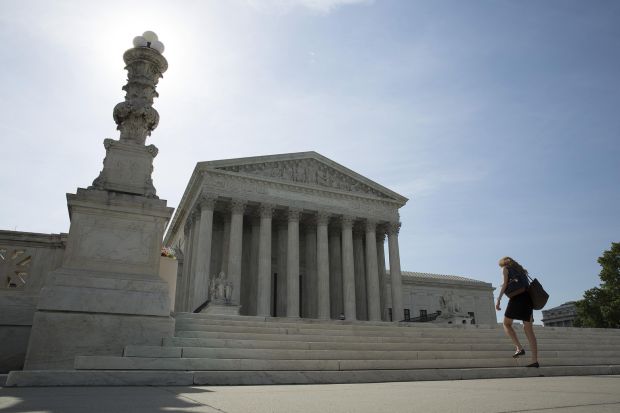WASHINGTON (CNS) — UPDATED — The Supreme Court Jan. 16 agreed to hear four cases over the constitutionality of same-sex marriage, tackling the questions of whether the 14th Amendment requires states to allow such marriages and whether it requires them to recognize same-sex marriages licensed in other states.
In brief orders, the court accepted petitions from Tennessee, Michigan, Kentucky and Ohio, consolidating them into one hearing that will be held probably in late April, meaning a decision would likely come before the end of the term in late June. The court allotted an unusually lengthy period of time for oral arguments, two and a half hours, compared to a typical 60-minute period.
As of Jan. 16, 36 states and the District of Columbia allow same-sex marriages, either under court rulings or state laws. In the other 14 states, they are prohibited, but those bans are all under legal challenge.
[hotblock]
The Catholic Church upholds marriage as a union between one man and one woman and teaches that any sexual activity outside of marriage is sinful. The church also teaches that homosexual attraction itself is not sinful and that homosexual people “must be accepted with respect, compassion and sensitivity.”
The chairman of the U.S. bishops’ Subcommittee for the Promotion and Defense of Marriage said that a decision by the Supreme Court on whether a state may define marriage as the union of one man and one woman “may be the most significant court decision since the court’s tragic 1973 Roe v. Wade decision making abortion a constitutional right.”
The cases accepted by the court are all from the 6th U.S. Circuit Court of Appeals. A three-judge panel of the 6th Circuit ruled in November that laws prohibiting same-sex marriage are constitutional. That 2-1 ruling came in the case of a lesbian couple in Michigan who sought to jointly adopt the special needs children they are raising together. The state will not allow adoption by couples that are not married and prohibits same-sex marriage.
The opinion said that although it is inevitable that same-sex marriage will be allowed nationwide, it is better to make that change through a political process, rather than a court ruling. The 6th Circuit was the first federal appeals court to find in favor of such bans. Four other federal appellate courts have found same-sex marriage prohibitions to be unconstitutional.
The case was fast-tracked to the Supreme Court, appealing directly to the nation’s highest court rather than seeking a ruling from the full Appeals Court. The Supreme Court previously had several times declined to accept petitions to review rulings that set aside same-sex marriage bans.
The court last delved into the issue with two cases decided in 2013. In one, it overturned the federal Defense of Marriage Act, which had limited the definition of “marriage” to a union of a man and a woman. In the other, it sent back to lower courts the question of the constitutionality of a California law banning same-sex marriage. The 9th U.S. Circuit Court of Appeals subsequently allowed same-sex marriages to proceed.
In those separate 5-4 rulings, the court struck down key parts of the federal DOMA and also refused to rule on the merits of a challenge to California’s Proposition 8, the voter-approved initiative barring same-sex marriage.
In the ruling on DOMA, the court said the federal government could not deny benefits to same-sex couples that were legally married in states that allow such unions based on the Equal Protection Clause.
In his Jan. 16 statement on the court’s decision to take the cases, Archbishop Salvatore J. Cordileone of San Francisco, the bishops’ subcommittee chairman, said: “It’s hard to imagine how the essential meaning of marriage as between the two sexes, understood in our nation for over 200 years, and consistent with every society throughout all of human history, could be declared illegal.”
Upholding traditional marriage “is not a judgment on anyone,” he said. “It is a matter of justice and truth. The central issue at stake is: what is marriage? The answer is: a bond which unites a man and a woman to each other and to any children who come from their union.”
U.S. Attorney General Eric Holder said the Obama administration would file an amicus, or friend of the court, brief calling for a decision by the justices that would “make marriage equality a reality for all Americans.”
James Esseks, director of the Lesbian Gay Bisexual Transgender & HIV Project of the American Civil Liberties Union, said in a statement that the ACLU was “thrilled the court will finally decide this issue. … The country is ready for a national solution that treats lesbian and gay couples fairly.” The ACLU is a co-counsel in the Kentucky case.
During his trip to the Philippines, Pope Francis made one of his strongest calls as pope against movements to recognize same-sex unions as marriage.
“The family is also threatened by growing efforts on the part of some to redefine the very institution of marriage,” the pope said Jan. 16, hours after warning that Philippine society was “tempted by confusing presentations of sexuality, marriage and the family.”
PREVIOUS: KKK-linked billboard puts Arkansas city and parishioners on defensive
NEXT: U.S. ambassador who fought for truth about churchwomen’s murders dies




Now that gays are acting like antebellum free citizens by going to their county clerk’s office and paying for a legal civil marriage license in 36 states, this brouhaha of a “culture war” will simmer down to a mere folderol. It is obvious that heterosexuals do not have a monopoly on love and commitment. May we live in cultural peace; may we live in peace.